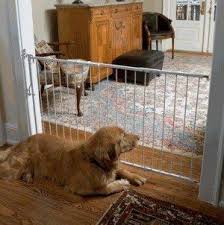Management is utilized a great deal in the beginning of a training program because it sets the dog up to succeed. It's like the alcoholic that has decided to stop drinking. They cannot successfully do this by going to the bar, even if just once a week. They have to manage themselves and set themselves up for success so that the long term result is the person is no longer drinking. This means attending AA meetings, getting rid of all alcohol in the home, not going to bars, etc. It's a whole new system they have to adopt if they want to change. There is no easy way around it. Either they do these things and manage themselves tightly in the beginning (so hopefully when further into their program they can actually go to a bar with a friend and use self discipline) or they will fail. It's just that simple.
We must do the same with our dogs. When we want to change our dogs' behavior we have to find ways to set them up for success while we are working toward our end goal. If your dog is barking viciously out of the windows at home then we need to change something. Management here would include blocking the windows (for now) so that the dog cannot practice this behavior. This is not fixing the problem but it's putting forth a management protocol that will aid in the success of all the other training we will be doing to help in the long run.
While most people can clearly visualize the situation with the alcoholic, many people cannot seem to grasp this concept with their dogs. I find a lot of resistance to management protocols with dogs. As humans we often seem to assume that dogs are here to do what we say when we say it and if they can't we'll force them into the scenario to make them understand what's wrong and why.
Management is just as important factor in a training program as the actual training and changing of behavior. This could be as simple as putting a puppy in a crate so that he cannot chew your things while you're out or as difficult as quitting your daily walks if your dog is reactive on a leash. Neither of the aforementioned are a life sentence, but rather a management protocol that can be eventually totally changed to something different once the training in place overrides the need for management.
So just remember, setting your dog up for success and managing your dog isn't a failure, it's a step in the right direction. I have a client right now that's doing an amazing job with her very leash reactive dog. We are to the point where I've suggested she can now start short walks. She knows what to do and how to help the dog when she sees other dogs. So she says to me, "I feel like I really chickened out the other day walking Fluffy. I saw another dog and I wasn't ready so I jumped behind the closest car and hid there with Fluffy until the dog was gone. I know I should have worked on her and done something else." I said, "Are you kidding?! That's great! If you knew you weren't mentally ready to handle that then you did the right thing. You set her up for success. She was not able to see the dog to react and you stuck it out until it was safe and she wasn't put in a position to react! I call that a success and good thinking!"
Don't ever feel like you're failing if you set your dog up to succeed, even if in that moment it's not actually "training". If your dog is put in a position to make a good choice, or at least not make a bad one, then you're winning!
Happy training ... and keep on working with your dogs to set them up to succeed!
Stacy Greer
Sunshine Dog Training & Behavior, LLC
servicing the Dallas/Ft Worth, Texas metroplex
Copyright© 2018. All rights reserved.




My dog (2 yrs German Shepherd) is reactive to other dogs and lunges towards them when we walk on Leash. When he was puppy, he was attacked by stray dogs, may be because of that, he has learnt this behaviour. We are trying our best to change it into positive thing for him, so that he does not get nervous when he sees other dogs. He was also left off leash with other dogs, so we know he is not aggressive, but he is a rough player and does not understand if the other dog doesn't want to play. He would keep poking.
ReplyDeleteYour blog always inspires me to keep working towards the goal. The relaxing exercise really works for Victor and he has learned to stay calm when we are busy.His attention seeking behaviour has reduced.I would love to understand and study the breed specific psychology of dogs. If you have any insights on the same, can you please share with us. Happy Weekend and would be waiting for your next blog :)